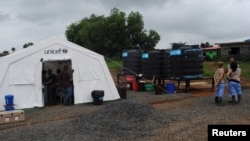The United Nations said the international community has pledged more than $3.4 billion in additional funds to help three West African states recover from the Ebola epidemic that killed more than 11,000 people and devastated their economies.
The meeting convened by U.N. Secretary-General Ban Ki-moon at U.N. Headquarters in New York raised an additional $3.4 billion in pledges to help in the recovery efforts of the three countries affected by Ebola.
The finance ministers of Liberia, Guinea and Sierra Leone had requested $3.2 billion to support a strategy aimed at getting their countries to zero infections for the next 24 months.
But at the end of the session, donor countries and international agencies had pledged well above what many analysts had predicted.
More than $5 billion
Conference pledges, combined with earlier promised donations bring the total funds pledged to $5.18 billion.
Speaking after the conference Friday, Helen Clark, head of the U.N. Development Program, said the conference went beyond financing "to forge new partnerships in support of recovery" between affected countries and donor partners.
Some of the early pledges included $495 million from the European Union, $745 million from the African Development Bank, $360 million from the Islamic Development Bank, $266 million from the U.S. and $340 million from Britain.
Warns against complacency
African Union Chairman Robert Mugabe warned the donor community against complacency, adding that “as long as West Africa still had cases of Ebola, the rest of our interconnected world was not safe."
Liberian President Ellen Johnson Sirleaf echoed the sentiment.
Sirleaf told the conference Friday that the "world has a great stake in how we respond to this global threat." She said the money would help the people of the three West Africa countries to rebuild their lives.
“The world is more interconnected and the Ebola knows not national boundaries," she said.
Guinea's president Alpha Conde called for debt cancelation for the three countries, and Sierra Leone's President Ernest Bai Koroma warned against complacency now that the epidemic is on the decline.
Challenge ahead
The main challenge now is how the funds will be collected and disbursed to the affected communities.
International aid agency Oxfam welcomed the financial support but asked that donor countries follow through with their pledges.
In the past there have been reports of promises that have been unfulfilled after such high-level donor meetings conclude.
In other cases, money donated for humanitarian responses is often unaccounted for, leaving affected communities without the necessary help.
In a statement released after the conference, Oxfam said, “It is now the donors’ and recipient governments’ responsibility to ensure that the promised funds are delivered in the most transparent and useful way.”
Ebola cases
In another development Friday, tests on the recent Ebola cases in Liberia show the virus is genetically similar to the strands that infected people in the region more than six months ago.
Health officials said the findings mean that the new outbreak is probably not due to the virus entering Liberia from neighboring countries.
Officials said the transmission was likely either undetected for weeks or was reactivated by an Ebola survivor.
Ebola is thought to be able to survive no more than 21 days in the blood. However, scientists say the virus might be able to survive for months in semen and some soft tissue.










